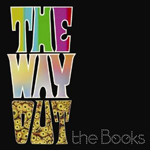|
|
 |
Dusted Reviews
Artist: The Books Album: The Way Out Label: Temporary Residence Review date: Jul. 20, 2010 |

|
|
|
 |
The Books are not modest about saying The Way Out is the best album they’ve ever made; however, neither are they being hyperbolic or boastful. In the five years since their last album proper, Lost and Safe, Nick Zammuto and Paul de Jong each got married, started families, and built and renovated houses. That is, they became adults in a real sense of the word, and that maturation process had a direct effect on their music. Much more layered, more nuanced, yet still retaining a playful spirit, Zammuto and de Jong have figured out how to make all the pieces fit together in a seamless way. This is the real triumph of the album. In the past, the movement was shakey or jarring; here it feels natural. That ability, the ability to make tonal shifts unnoticeable, is extremely commendable. While The Books have been quite popular and critical darlings since their first album, The Way Out — a swiftly moving, dynamic album whose movement is hidden — does what their previously releases only really hinted at.
Albums run the gamut from being simply a collection of songs that have no connection to being coherent pieces of art that win or lose on the strength, or lack thereof, of the whole. No matter what though, bands tend to keep an even tone over the length of an album. Even if it’s a mere assemblage with no artistic pretensions beyond a hook or two, the album, as a whole, is dour or amiable or irate. This isn’t to say that the emotional content of an album is necessarily even-keeled. Dolorous songs are often sat right beside the cheery, love-lost and lovelorn beside hopeful and adoring, keening up against joy. These shifts are expected, and often it’s the emotional arc that makes it interesting, even if the aesthetic content of the album is merely a hodgepodge.
Tonally, though, an album gains a certain character, and it’s very difficult to create one that shifts its tone internally without throwing the listener off, not necessarily overtly, but with subtle, non-conscious feelings of unease. Serious albums are rarely playful — or they rarely do it well — and vice versa. This is because, unlike emotional content, which we witness as being mercurial in our own lives, the tone of a work of art is expected to be consistent. The tone, if nothing else, is what truly holds an album or film together, and glaring tonal shifts often reveal that the artist doesn’t have true control of the artwork. It’s almost a signal to the audience that the artwork has gotten away from the artist, and on some level, we lose interest in these films and albums because we recognize that what’s missing is that human element of control. This is the familiar theme of monster movies. A rebellious creature. A destructive behemoth. Intentional monsters are one thing, but the unintentional are just forces moving willy-nilly this way and that. There’s no rhyme or reason to the creation’s movements, so there’s nothing to figure out. It just is.
The point of this all is to say that The Way Out navigates the tonal problem in an incredibly graceful manner. The Books have always been both playful and serious, but their latest album moves between the two easily and without making the listener take note. It is so subtle that even when paying attention, it still feels natural. Part of this is marrying the tonal shifts to the dynamic nature of the album, which in its most swift moments mirrors the spirit of people like John Zorn and Max Tundra. Take a song like “Thirty Incoming,” which opens with a sincere moment of a man on an answering machine talking to a woman he has gone on a date with. Behind it, the pregnant minimalist tone of an indie film plays as the man says, “Really felt good to lay down next to you. I didn’t realize how much I missed that feeling.” The dialtone of the phone then wavers into the song, transitioning naturally. Midway through, the answering machine message becomes silly, and this itself segues into a beautiful vocal harmony. What’s more impressive is that Zammuto and de Jong are able to navigate the silly without making it serious and the serious without making it silly. The new agey samples could easily have been gimmicky, used in an ironic and detached way. But instead, detourned, they are able to be both. In this sense, there is perhaps a consistent tone that ranges over the whole album, but one whose nature is to be both at once.
By Andrew Beckerman
|







